Comparing Management Approaches: A Reflective Paper on Module Learning
VerifiedAdded on 2023/06/18
|7
|1344
|473
Essay
AI Summary
This reflective paper analyzes the learning and experience gained from a module on traditional and contemporary management approaches. It uses Gibbs Reflective Theory to structure the reflection, covering description, feelings, evaluation, analysis, conclusion, and action plan. The paper discusses the evolution of management theories, comparing scientific management and rational goal models with contemporary models like internal process, open systems, rational goal, and human relations. It addresses the student's experience with weekly studies and a formative assignment, highlighting areas of strength and areas needing improvement, such as communication, referencing, and academic writing skills. The action plan proposes specific steps for skill development, aiming to enhance overall proficiency in these areas. The conclusion emphasizes the value of reflective practice in identifying learning gaps and fostering continuous improvement.
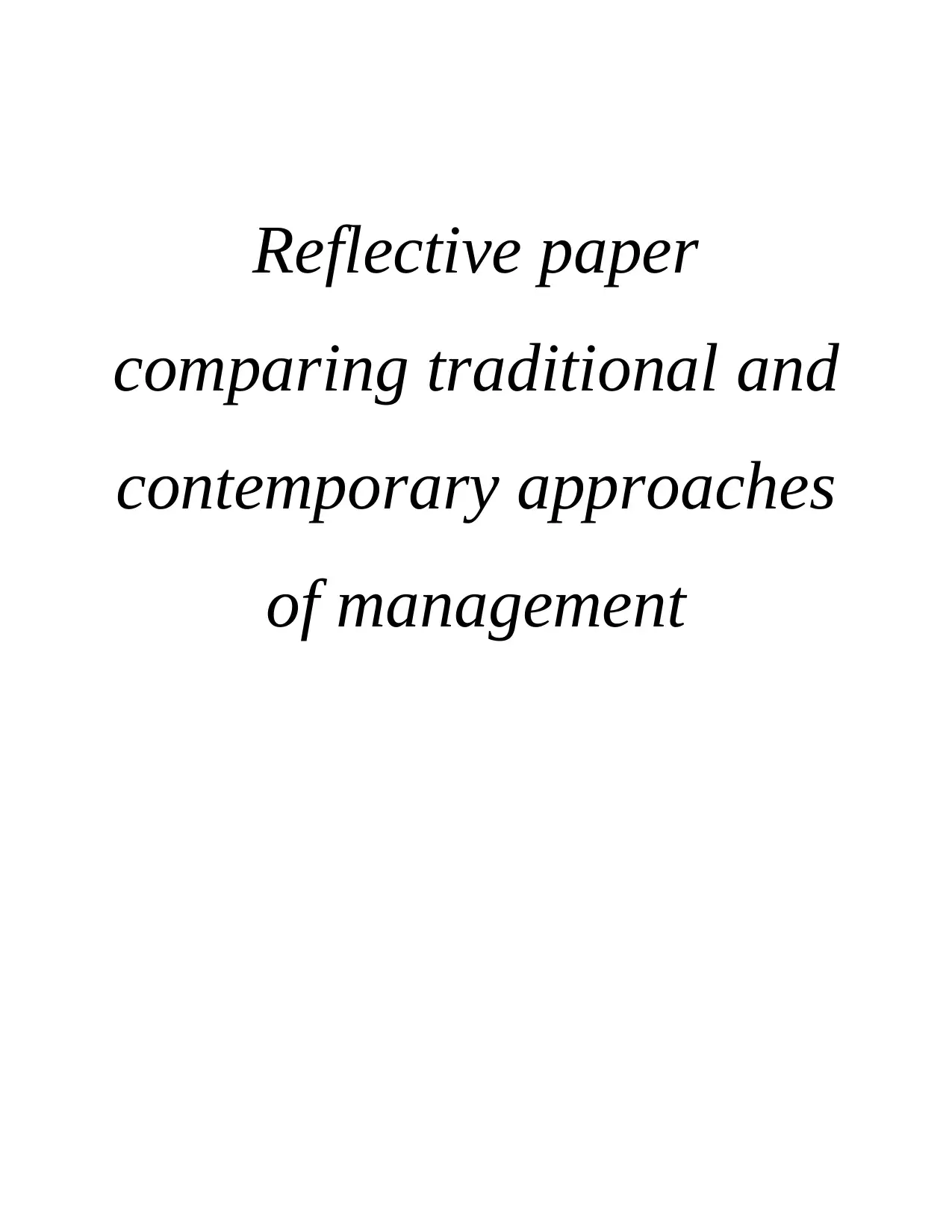
Reflective paper
comparing traditional and
contemporary approaches
of management
comparing traditional and
contemporary approaches
of management
Paraphrase This Document
Need a fresh take? Get an instant paraphrase of this document with our AI Paraphraser
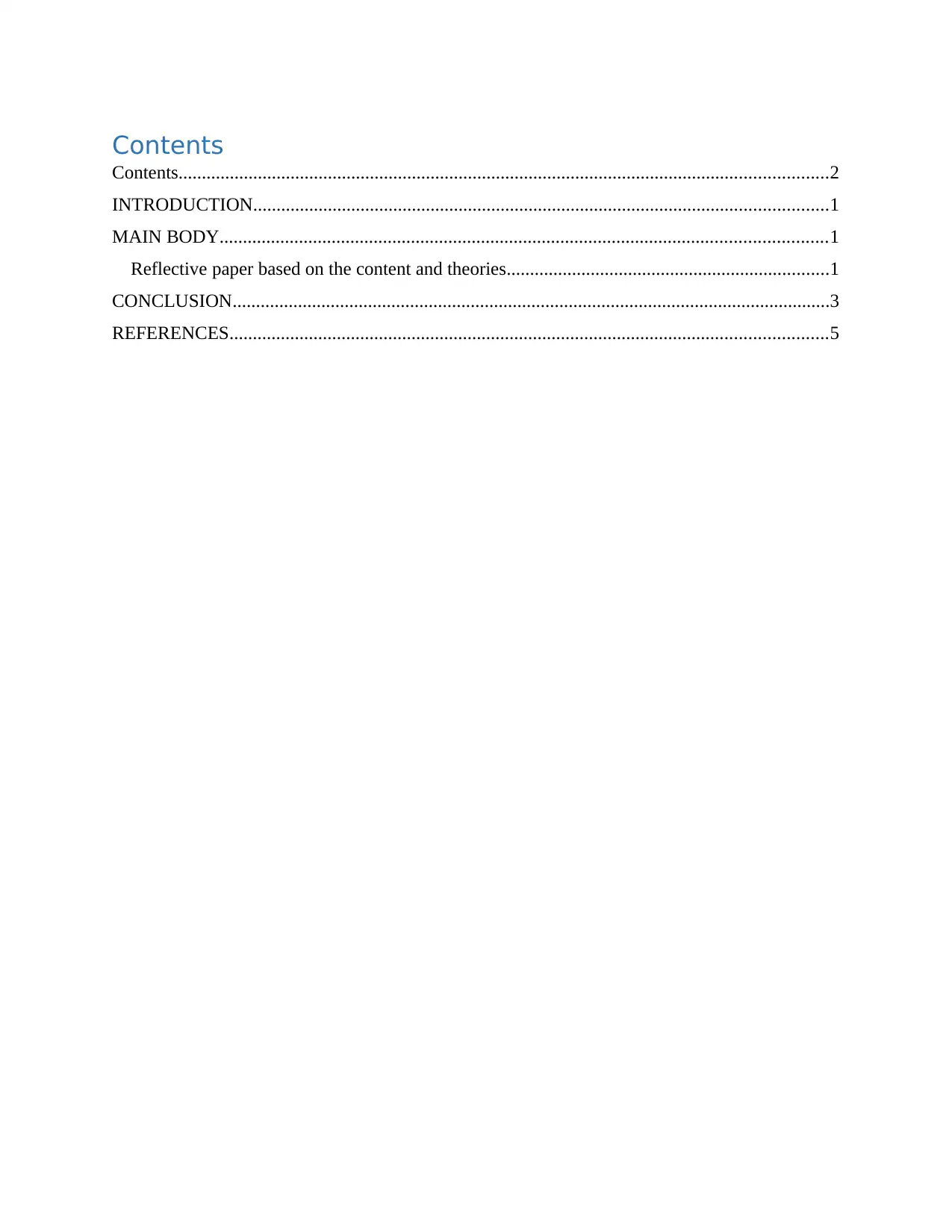
Contents
Contents...........................................................................................................................................2
INTRODUCTION...........................................................................................................................1
MAIN BODY..................................................................................................................................1
Reflective paper based on the content and theories.....................................................................1
CONCLUSION................................................................................................................................3
REFERENCES................................................................................................................................5
Contents...........................................................................................................................................2
INTRODUCTION...........................................................................................................................1
MAIN BODY..................................................................................................................................1
Reflective paper based on the content and theories.....................................................................1
CONCLUSION................................................................................................................................3
REFERENCES................................................................................................................................5
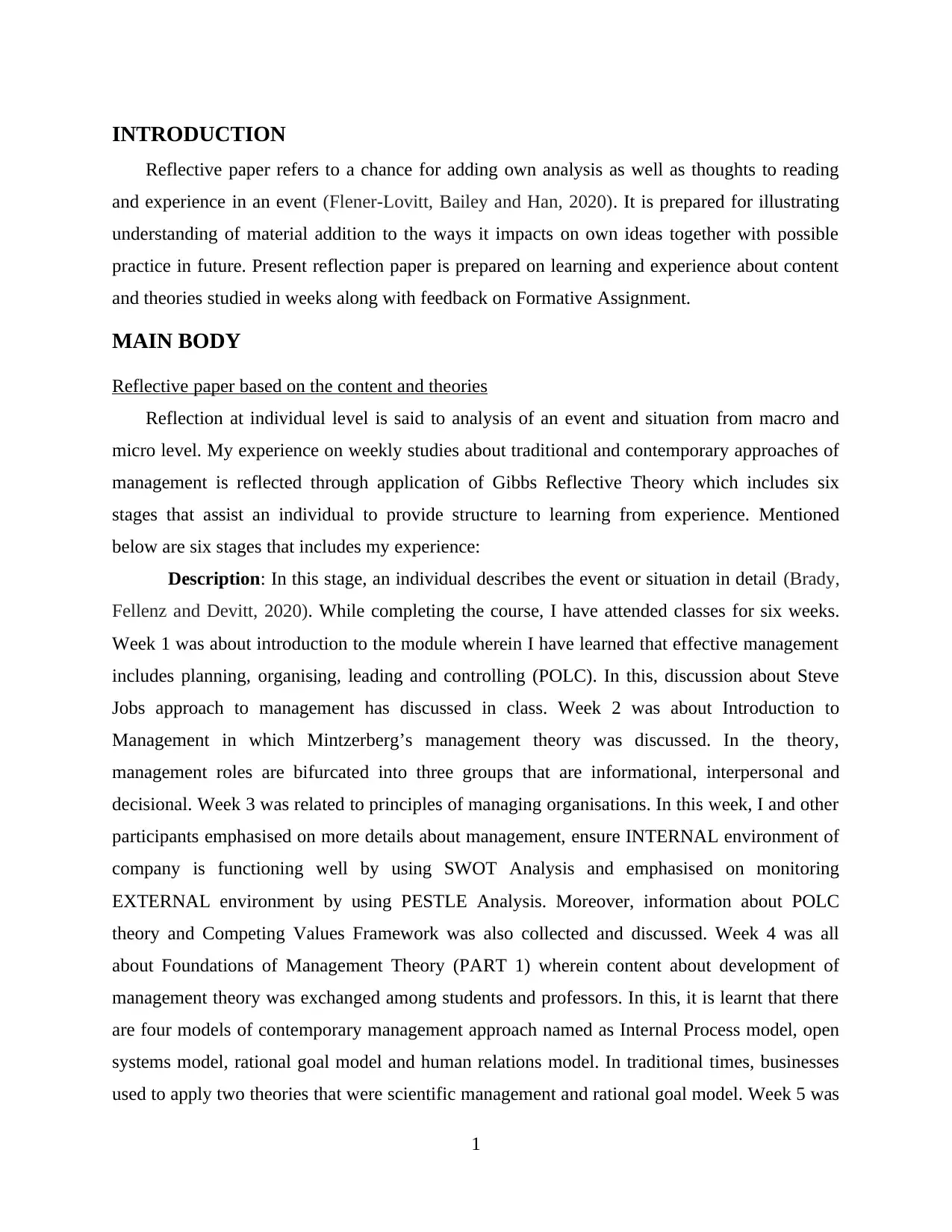
INTRODUCTION
Reflective paper refers to a chance for adding own analysis as well as thoughts to reading
and experience in an event (Flener-Lovitt, Bailey and Han, 2020). It is prepared for illustrating
understanding of material addition to the ways it impacts on own ideas together with possible
practice in future. Present reflection paper is prepared on learning and experience about content
and theories studied in weeks along with feedback on Formative Assignment.
MAIN BODY
Reflective paper based on the content and theories
Reflection at individual level is said to analysis of an event and situation from macro and
micro level. My experience on weekly studies about traditional and contemporary approaches of
management is reflected through application of Gibbs Reflective Theory which includes six
stages that assist an individual to provide structure to learning from experience. Mentioned
below are six stages that includes my experience:
Description: In this stage, an individual describes the event or situation in detail (Brady,
Fellenz and Devitt, 2020). While completing the course, I have attended classes for six weeks.
Week 1 was about introduction to the module wherein I have learned that effective management
includes planning, organising, leading and controlling (POLC). In this, discussion about Steve
Jobs approach to management has discussed in class. Week 2 was about Introduction to
Management in which Mintzerberg’s management theory was discussed. In the theory,
management roles are bifurcated into three groups that are informational, interpersonal and
decisional. Week 3 was related to principles of managing organisations. In this week, I and other
participants emphasised on more details about management, ensure INTERNAL environment of
company is functioning well by using SWOT Analysis and emphasised on monitoring
EXTERNAL environment by using PESTLE Analysis. Moreover, information about POLC
theory and Competing Values Framework was also collected and discussed. Week 4 was all
about Foundations of Management Theory (PART 1) wherein content about development of
management theory was exchanged among students and professors. In this, it is learnt that there
are four models of contemporary management approach named as Internal Process model, open
systems model, rational goal model and human relations model. In traditional times, businesses
used to apply two theories that were scientific management and rational goal model. Week 5 was
1
Reflective paper refers to a chance for adding own analysis as well as thoughts to reading
and experience in an event (Flener-Lovitt, Bailey and Han, 2020). It is prepared for illustrating
understanding of material addition to the ways it impacts on own ideas together with possible
practice in future. Present reflection paper is prepared on learning and experience about content
and theories studied in weeks along with feedback on Formative Assignment.
MAIN BODY
Reflective paper based on the content and theories
Reflection at individual level is said to analysis of an event and situation from macro and
micro level. My experience on weekly studies about traditional and contemporary approaches of
management is reflected through application of Gibbs Reflective Theory which includes six
stages that assist an individual to provide structure to learning from experience. Mentioned
below are six stages that includes my experience:
Description: In this stage, an individual describes the event or situation in detail (Brady,
Fellenz and Devitt, 2020). While completing the course, I have attended classes for six weeks.
Week 1 was about introduction to the module wherein I have learned that effective management
includes planning, organising, leading and controlling (POLC). In this, discussion about Steve
Jobs approach to management has discussed in class. Week 2 was about Introduction to
Management in which Mintzerberg’s management theory was discussed. In the theory,
management roles are bifurcated into three groups that are informational, interpersonal and
decisional. Week 3 was related to principles of managing organisations. In this week, I and other
participants emphasised on more details about management, ensure INTERNAL environment of
company is functioning well by using SWOT Analysis and emphasised on monitoring
EXTERNAL environment by using PESTLE Analysis. Moreover, information about POLC
theory and Competing Values Framework was also collected and discussed. Week 4 was all
about Foundations of Management Theory (PART 1) wherein content about development of
management theory was exchanged among students and professors. In this, it is learnt that there
are four models of contemporary management approach named as Internal Process model, open
systems model, rational goal model and human relations model. In traditional times, businesses
used to apply two theories that were scientific management and rational goal model. Week 5 was
1
⊘ This is a preview!⊘
Do you want full access?
Subscribe today to unlock all pages.

Trusted by 1+ million students worldwide
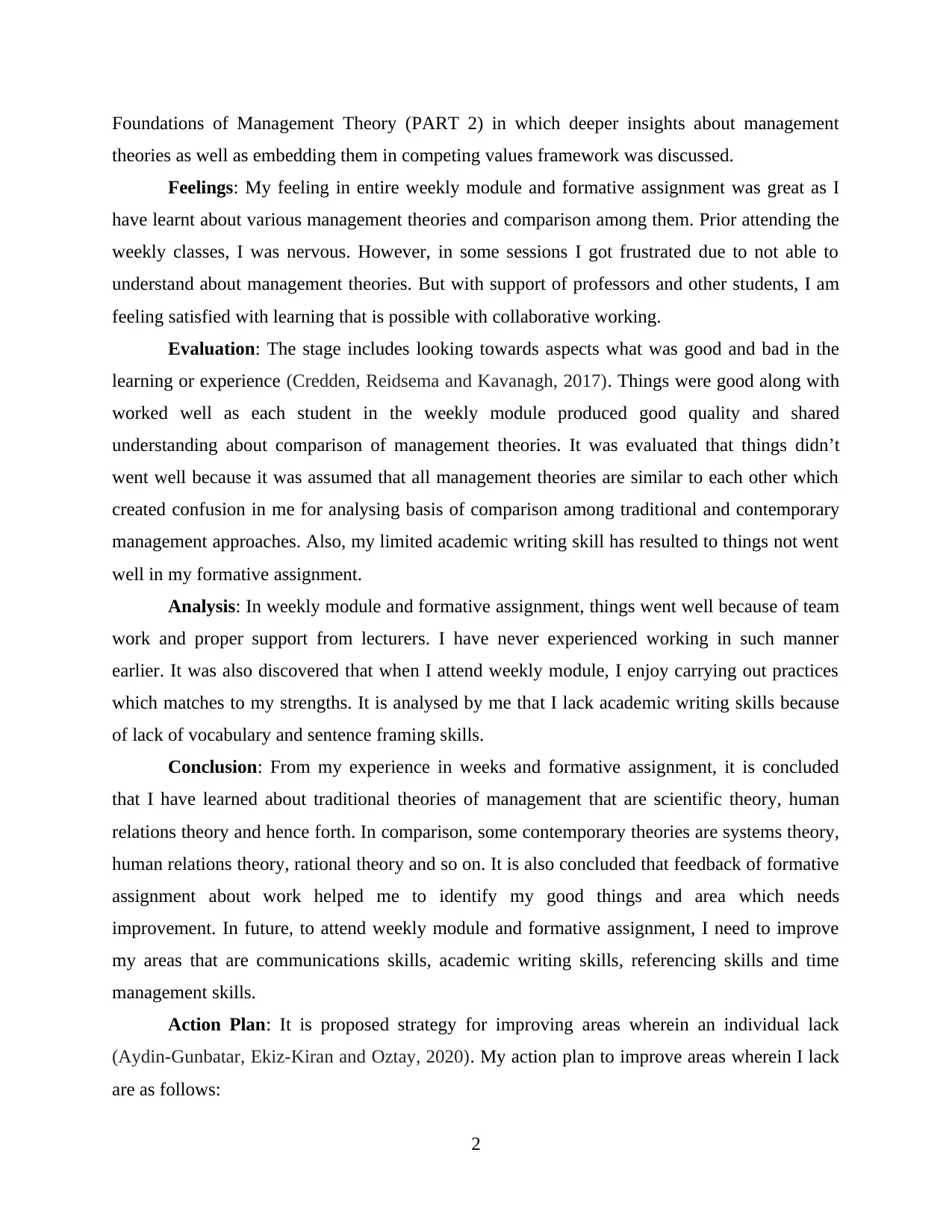
Foundations of Management Theory (PART 2) in which deeper insights about management
theories as well as embedding them in competing values framework was discussed.
Feelings: My feeling in entire weekly module and formative assignment was great as I
have learnt about various management theories and comparison among them. Prior attending the
weekly classes, I was nervous. However, in some sessions I got frustrated due to not able to
understand about management theories. But with support of professors and other students, I am
feeling satisfied with learning that is possible with collaborative working.
Evaluation: The stage includes looking towards aspects what was good and bad in the
learning or experience (Credden, Reidsema and Kavanagh, 2017). Things were good along with
worked well as each student in the weekly module produced good quality and shared
understanding about comparison of management theories. It was evaluated that things didn’t
went well because it was assumed that all management theories are similar to each other which
created confusion in me for analysing basis of comparison among traditional and contemporary
management approaches. Also, my limited academic writing skill has resulted to things not went
well in my formative assignment.
Analysis: In weekly module and formative assignment, things went well because of team
work and proper support from lecturers. I have never experienced working in such manner
earlier. It was also discovered that when I attend weekly module, I enjoy carrying out practices
which matches to my strengths. It is analysed by me that I lack academic writing skills because
of lack of vocabulary and sentence framing skills.
Conclusion: From my experience in weeks and formative assignment, it is concluded
that I have learned about traditional theories of management that are scientific theory, human
relations theory and hence forth. In comparison, some contemporary theories are systems theory,
human relations theory, rational theory and so on. It is also concluded that feedback of formative
assignment about work helped me to identify my good things and area which needs
improvement. In future, to attend weekly module and formative assignment, I need to improve
my areas that are communications skills, academic writing skills, referencing skills and time
management skills.
Action Plan: It is proposed strategy for improving areas wherein an individual lack
(Aydin-Gunbatar, Ekiz-Kiran and Oztay, 2020). My action plan to improve areas wherein I lack
are as follows:
2
theories as well as embedding them in competing values framework was discussed.
Feelings: My feeling in entire weekly module and formative assignment was great as I
have learnt about various management theories and comparison among them. Prior attending the
weekly classes, I was nervous. However, in some sessions I got frustrated due to not able to
understand about management theories. But with support of professors and other students, I am
feeling satisfied with learning that is possible with collaborative working.
Evaluation: The stage includes looking towards aspects what was good and bad in the
learning or experience (Credden, Reidsema and Kavanagh, 2017). Things were good along with
worked well as each student in the weekly module produced good quality and shared
understanding about comparison of management theories. It was evaluated that things didn’t
went well because it was assumed that all management theories are similar to each other which
created confusion in me for analysing basis of comparison among traditional and contemporary
management approaches. Also, my limited academic writing skill has resulted to things not went
well in my formative assignment.
Analysis: In weekly module and formative assignment, things went well because of team
work and proper support from lecturers. I have never experienced working in such manner
earlier. It was also discovered that when I attend weekly module, I enjoy carrying out practices
which matches to my strengths. It is analysed by me that I lack academic writing skills because
of lack of vocabulary and sentence framing skills.
Conclusion: From my experience in weeks and formative assignment, it is concluded
that I have learned about traditional theories of management that are scientific theory, human
relations theory and hence forth. In comparison, some contemporary theories are systems theory,
human relations theory, rational theory and so on. It is also concluded that feedback of formative
assignment about work helped me to identify my good things and area which needs
improvement. In future, to attend weekly module and formative assignment, I need to improve
my areas that are communications skills, academic writing skills, referencing skills and time
management skills.
Action Plan: It is proposed strategy for improving areas wherein an individual lack
(Aydin-Gunbatar, Ekiz-Kiran and Oztay, 2020). My action plan to improve areas wherein I lack
are as follows:
2
Paraphrase This Document
Need a fresh take? Get an instant paraphrase of this document with our AI Paraphraser
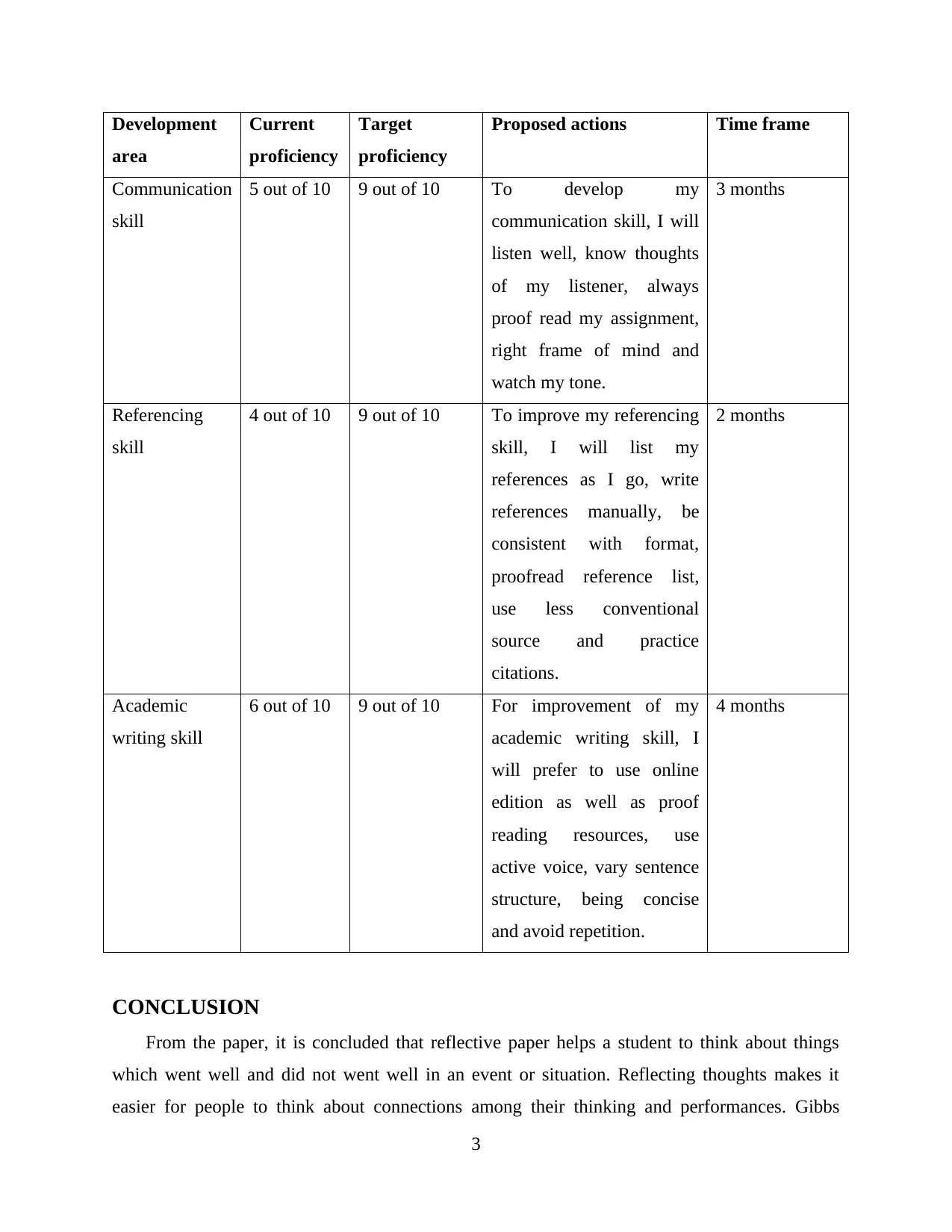
Development
area
Current
proficiency
Target
proficiency
Proposed actions Time frame
Communication
skill
5 out of 10 9 out of 10 To develop my
communication skill, I will
listen well, know thoughts
of my listener, always
proof read my assignment,
right frame of mind and
watch my tone.
3 months
Referencing
skill
4 out of 10 9 out of 10 To improve my referencing
skill, I will list my
references as I go, write
references manually, be
consistent with format,
proofread reference list,
use less conventional
source and practice
citations.
2 months
Academic
writing skill
6 out of 10 9 out of 10 For improvement of my
academic writing skill, I
will prefer to use online
edition as well as proof
reading resources, use
active voice, vary sentence
structure, being concise
and avoid repetition.
4 months
CONCLUSION
From the paper, it is concluded that reflective paper helps a student to think about things
which went well and did not went well in an event or situation. Reflecting thoughts makes it
easier for people to think about connections among their thinking and performances. Gibbs
3
area
Current
proficiency
Target
proficiency
Proposed actions Time frame
Communication
skill
5 out of 10 9 out of 10 To develop my
communication skill, I will
listen well, know thoughts
of my listener, always
proof read my assignment,
right frame of mind and
watch my tone.
3 months
Referencing
skill
4 out of 10 9 out of 10 To improve my referencing
skill, I will list my
references as I go, write
references manually, be
consistent with format,
proofread reference list,
use less conventional
source and practice
citations.
2 months
Academic
writing skill
6 out of 10 9 out of 10 For improvement of my
academic writing skill, I
will prefer to use online
edition as well as proof
reading resources, use
active voice, vary sentence
structure, being concise
and avoid repetition.
4 months
CONCLUSION
From the paper, it is concluded that reflective paper helps a student to think about things
which went well and did not went well in an event or situation. Reflecting thoughts makes it
easier for people to think about connections among their thinking and performances. Gibbs
3
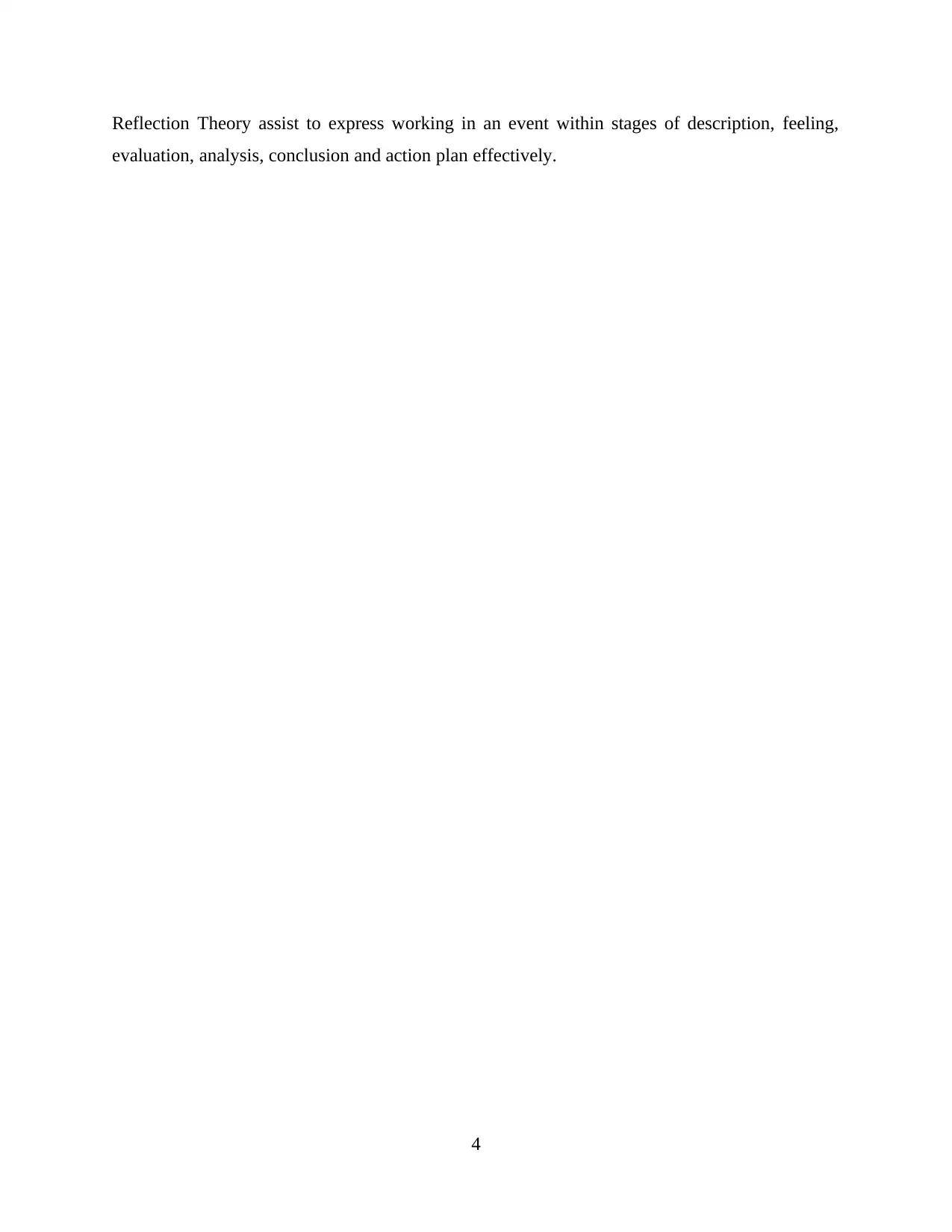
Reflection Theory assist to express working in an event within stages of description, feeling,
evaluation, analysis, conclusion and action plan effectively.
4
evaluation, analysis, conclusion and action plan effectively.
4
⊘ This is a preview!⊘
Do you want full access?
Subscribe today to unlock all pages.

Trusted by 1+ million students worldwide
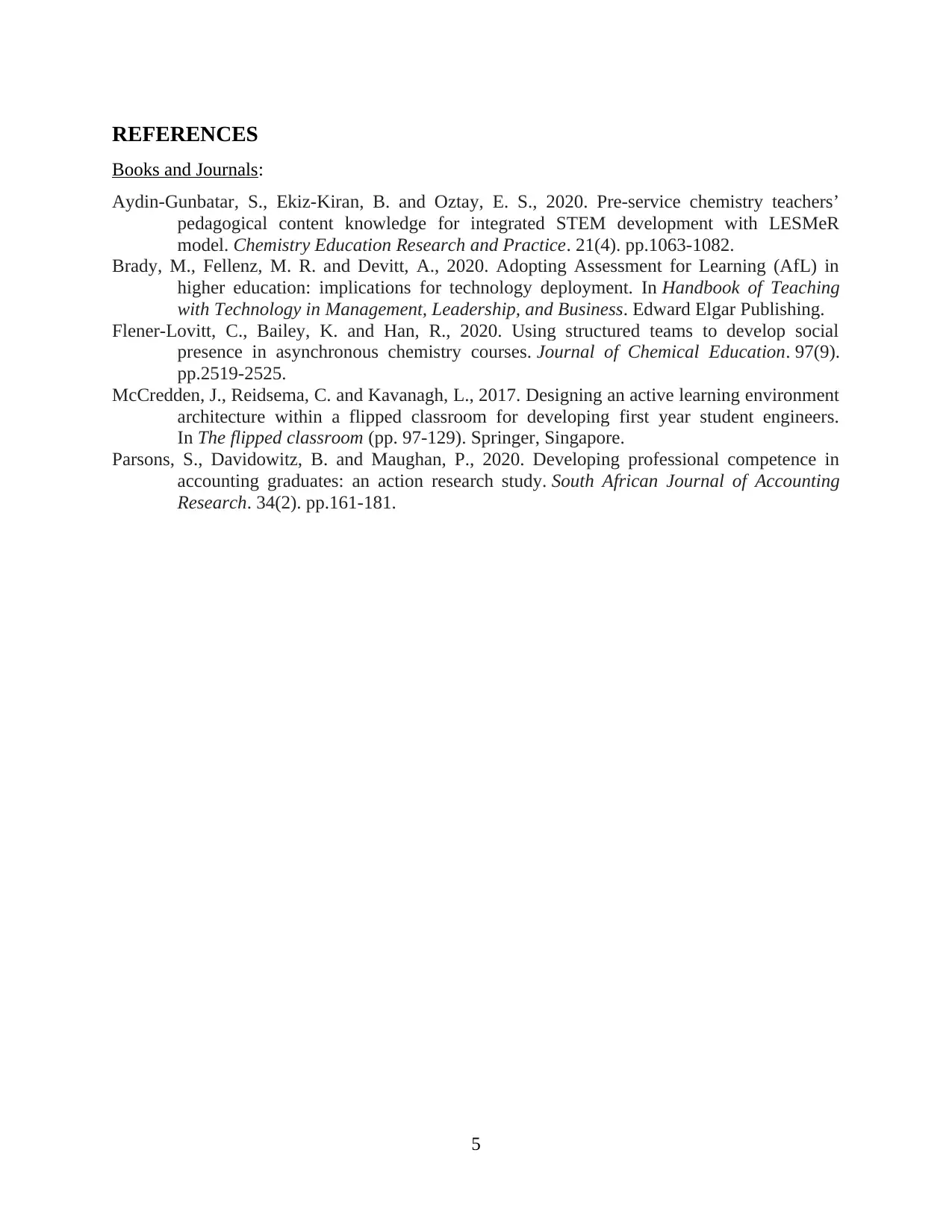
REFERENCES
Books and Journals:
Aydin-Gunbatar, S., Ekiz-Kiran, B. and Oztay, E. S., 2020. Pre-service chemistry teachers’
pedagogical content knowledge for integrated STEM development with LESMeR
model. Chemistry Education Research and Practice. 21(4). pp.1063-1082.
Brady, M., Fellenz, M. R. and Devitt, A., 2020. Adopting Assessment for Learning (AfL) in
higher education: implications for technology deployment. In Handbook of Teaching
with Technology in Management, Leadership, and Business. Edward Elgar Publishing.
Flener-Lovitt, C., Bailey, K. and Han, R., 2020. Using structured teams to develop social
presence in asynchronous chemistry courses. Journal of Chemical Education. 97(9).
pp.2519-2525.
McCredden, J., Reidsema, C. and Kavanagh, L., 2017. Designing an active learning environment
architecture within a flipped classroom for developing first year student engineers.
In The flipped classroom (pp. 97-129). Springer, Singapore.
Parsons, S., Davidowitz, B. and Maughan, P., 2020. Developing professional competence in
accounting graduates: an action research study. South African Journal of Accounting
Research. 34(2). pp.161-181.
5
Books and Journals:
Aydin-Gunbatar, S., Ekiz-Kiran, B. and Oztay, E. S., 2020. Pre-service chemistry teachers’
pedagogical content knowledge for integrated STEM development with LESMeR
model. Chemistry Education Research and Practice. 21(4). pp.1063-1082.
Brady, M., Fellenz, M. R. and Devitt, A., 2020. Adopting Assessment for Learning (AfL) in
higher education: implications for technology deployment. In Handbook of Teaching
with Technology in Management, Leadership, and Business. Edward Elgar Publishing.
Flener-Lovitt, C., Bailey, K. and Han, R., 2020. Using structured teams to develop social
presence in asynchronous chemistry courses. Journal of Chemical Education. 97(9).
pp.2519-2525.
McCredden, J., Reidsema, C. and Kavanagh, L., 2017. Designing an active learning environment
architecture within a flipped classroom for developing first year student engineers.
In The flipped classroom (pp. 97-129). Springer, Singapore.
Parsons, S., Davidowitz, B. and Maughan, P., 2020. Developing professional competence in
accounting graduates: an action research study. South African Journal of Accounting
Research. 34(2). pp.161-181.
5
1 out of 7
Related Documents
Your All-in-One AI-Powered Toolkit for Academic Success.
+13062052269
info@desklib.com
Available 24*7 on WhatsApp / Email
![[object Object]](/_next/static/media/star-bottom.7253800d.svg)
Unlock your academic potential
Copyright © 2020–2026 A2Z Services. All Rights Reserved. Developed and managed by ZUCOL.





